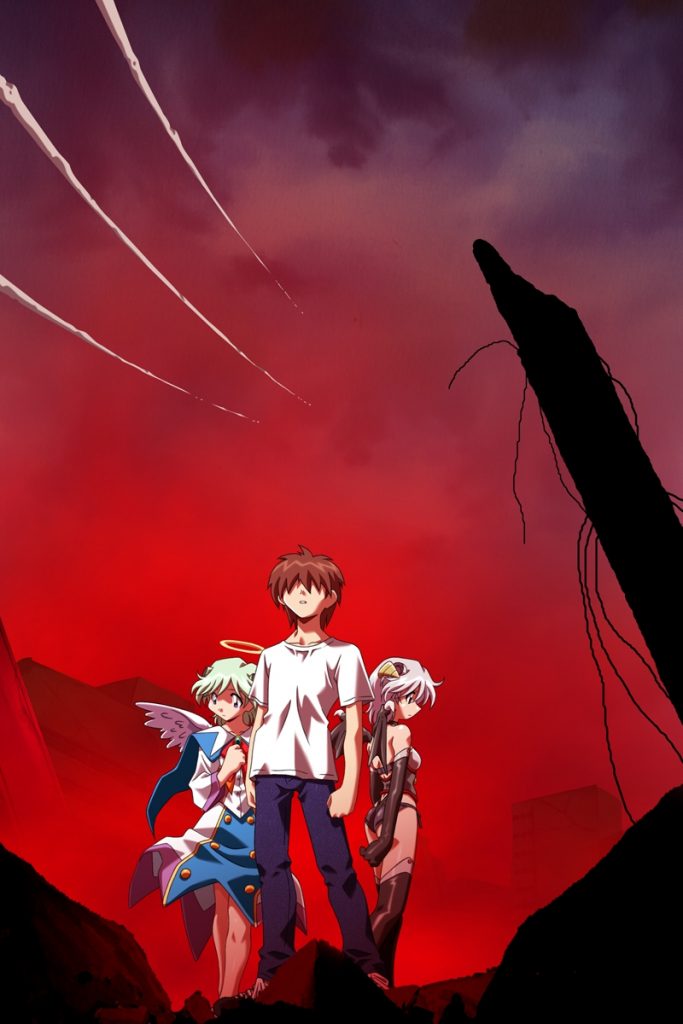Views below do not necessarily reflect my own
MoonEarth (fictional) is written to represent the real life TerraLunar – everything from its location in Nerima to its eventual fate (bankruptcy shortly before the game finished). TerraLunar pursued a philosophy of low-key promotion and heartfelt production – works that were critically-received, but did not sell. During the production of Rakuen, Muraji Yuuta realized that it would be TerraLunar’s final work – as the company itself went insolvent shortly before Rakuen‘s completion. The act of panicking to raise funds & to go ‘independent’ (as shown in the plot of Rakuen) mirrors reality – and indeed, TerraLunar did go independent briefly. But, ultimately, they closed down a few months after due to poor sales. Rakuen was released in 2004, during the heyday of the typical galge. Rakuen was never written to appeal to a broad audience – it had a realistic script, varied presentation styles, and a rock-focused soundtrack. Rakuen itself is written to be hard-to-understand unless you were an otaku – with its inside references & at times, opaque & bullet-speed writing style.
Characters in Rakuen, while eroge-fied, represent their real-life counterparts. Boku represents the younger, otaku Muraji, whereas Karen represents the older, more jaded Muraji – the ‘supervisor’ version of himself. Indeed, at the end of the game, Murajii (through Karen) confirms this fact. For its era, the rock & guitar music was atypical. Legend has it that Muraji lent his prized Gibson to the composer and told him to make songs that “he liked.” The game of Rakuen was built around the music – as opposed to the music being produced for the game.
The oft-quoted phrase 堕落する準備はOK?reflects the unembellished philosophy of Muraji. The phrase represents the inexorable conflict between ‘reality’ & 2D culture – a beautiful, sincere prayer for the ideal that cannot be. Societal views & rationality are at odds with the ideals normally espoused by otaku – you cannot wholeheartedly pursue this art form without a back-up plan. For TerraLunar, the real-life studio went bankrupt in pursuit of this ideal – by producing games driven by an esoteric artistic vision – that alienated a mainstream with deeper pockets. Had it been money-seeking, like the fictional MINI-ME, it might have survived (but at what cost?). For the character, boku – he has to choose between his life (going to college) and his passion (drawing) – he never hits it big in any of the endings for a reason. Those who wholeheartedly pursue 2D culture are called degenerates by society – but once you’ve fallen down the rabbit hole of otaku culture, it becomes a fool’s errand to dig yourself out (indeed, and for this reason, the phrase 堕落する – is better translated as ‘fall’ as opposed to a more figurative ‘corrupt’ or ‘deprave’).
In Rakuen, Muraji is able to juxtapose reality with idealism, to ultimately paint his message. He describes the 2D world as “the most beautiful sight viewed from the depths of hell.” There’s something poetic about that statement – where for many, to be a true otaku – to have fully seen the wonder of the 2D world – you’ve gotta devote yourself to it fully – like an ascetic monk. Spending your paychecks to buy multiple copies of a game to keep your favorite studio afloat; alienating the 3D for the 2D – living a life that can only be called self-deprecatingly degenerate. The work itself – as Rakuen – as paradise – could be said to represent the unabashed pursuit of 2D idealism. The recurrent, relentless God in the work – the unforgiving society who keeps the otaku in check.
Portions adapted/paraphrased (feat. DeepTL) from this article.
very good …